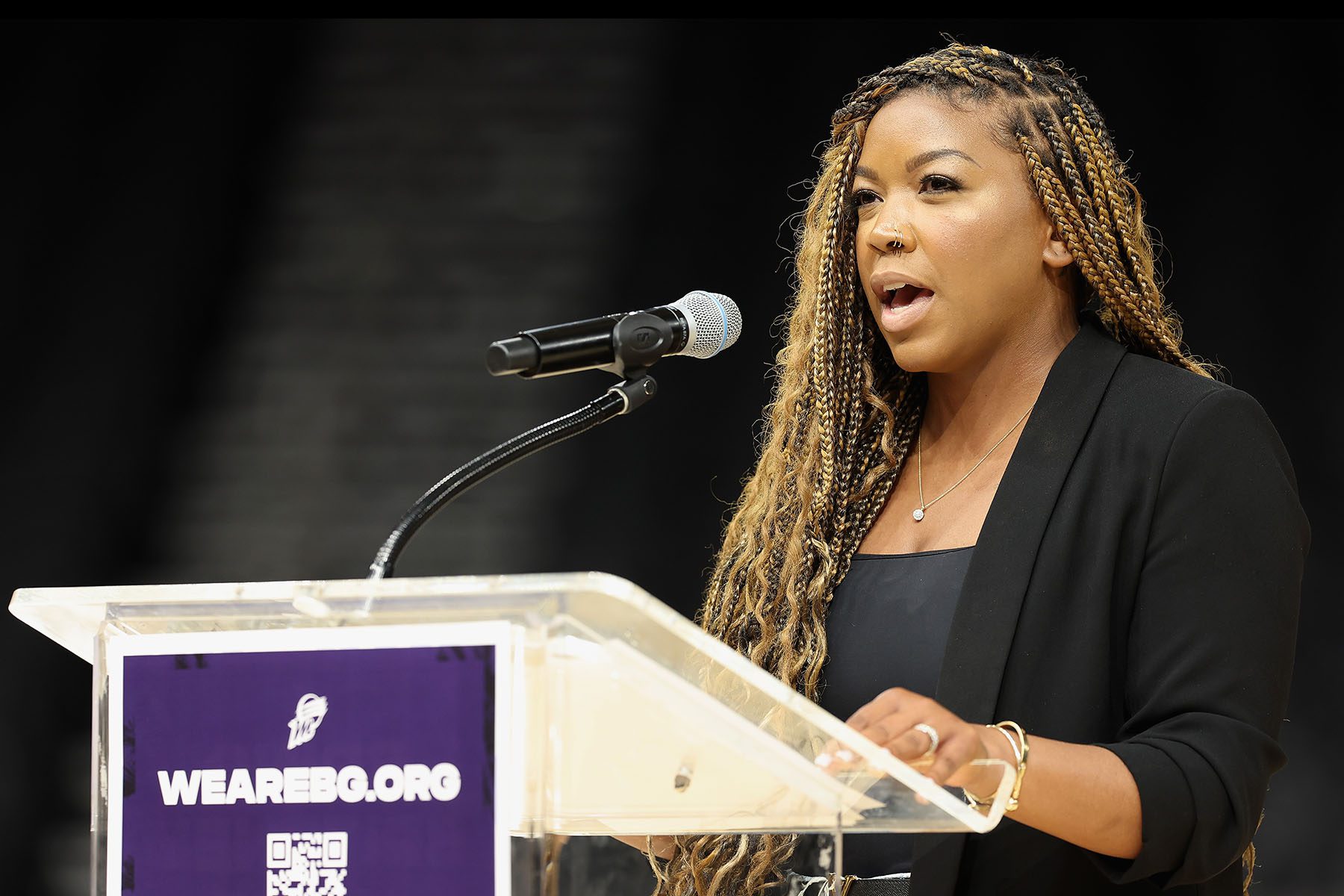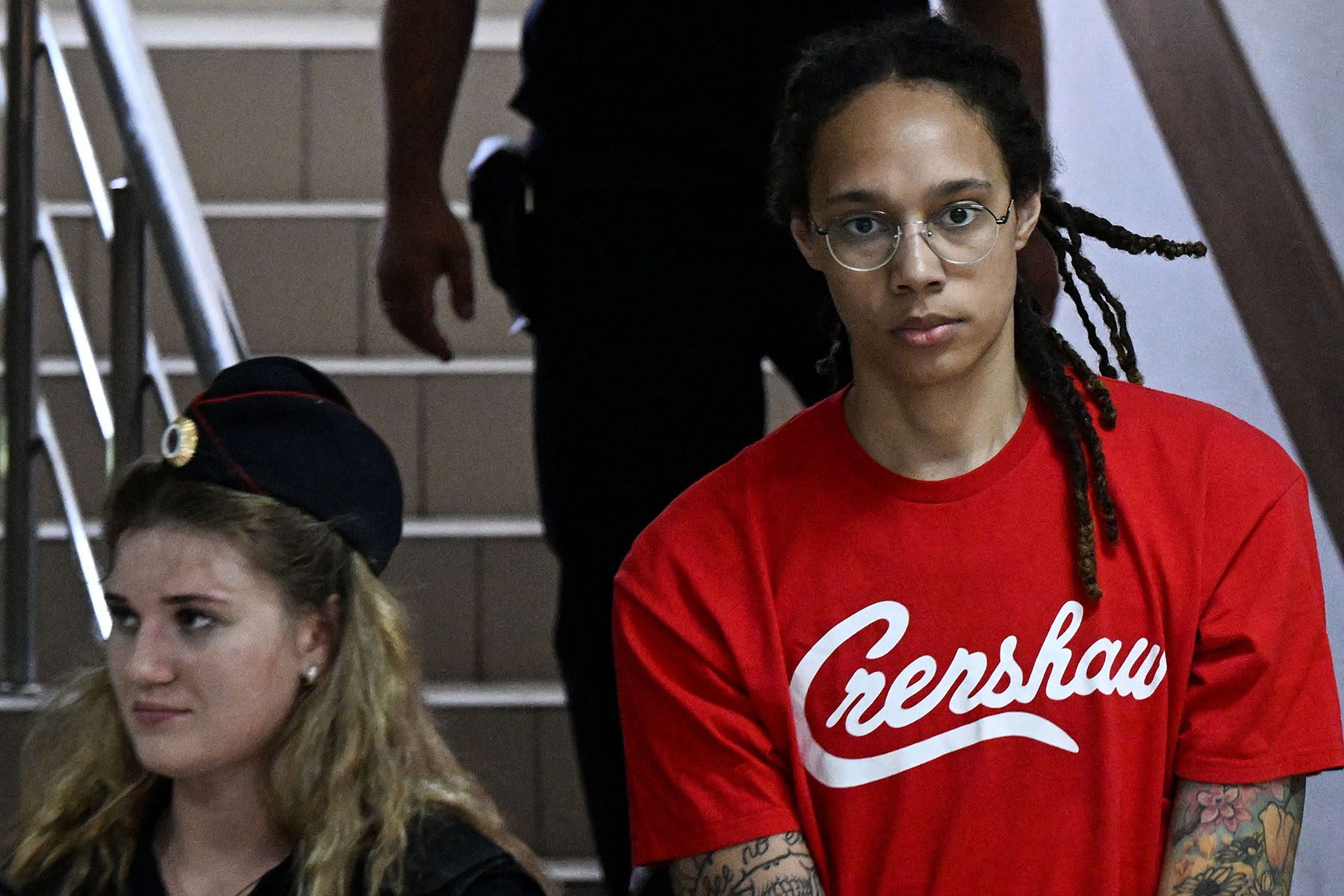WNBA star and Olympic gold medalist Brittney Griner pleaded guilty Thursday to drug charges in Russia, where she has been held for 140 days in what the U.S. government has classified as a wrongful detainment. In a statement shared with The 19th, Griner’s lawyers said the guilty plea “was her decision informed by discussion with her legal defense team in Russia,” and they expect her trial to conclude in August.
Cherelle Griner and Griner’s supporters stepped up public pressure this week as her criminal trial resumed Thursday, beginning Monday with Brittney Griner penning a letter to President Joe Biden in which she pleaded for him not to forget her and other American detainees.
The mounting pressure on Biden’s administration to act quickly on her release seemingly clashes with the harsh reality of what’s referred to as hostage diplomacy. Experts told The 19th that despite the public’s hopes, Griner’s trial, which will continue after her guilty plea, may only be the beginning of a long journey back to the United States.
Griner, 31, has played professional basketball in Russia during the WNBA off-season since 2014. She was arrested on February 17 at a Moscow airport after Russian authorities claimed to have found cannabis oil and vape cartridges in her luggage, charges that could result in up to 10 years in prison if she’s convicted. One week after Griner’s arrest, Russia invaded Ukraine, prompting international criticism and U.S. sanctions.
In her guilty plea Thursday, Griner said she hadn’t intended any wrongdoing.
“I’d like to plead guilty, your honor. But there was no intent. I didn’t want to break the law,” she said in English, which was then translated into Russian, according to Reuters.
In their statement to The 19th, Griner’s legal team in Russia said she “decided to take full responsibility for her actions as she knows that she is a role model for many people,” adding that they hope the plea will be “considered by the court as a mitigating factor and there will be no severe sentence.”
The timing of Griner’s arrest has given Russia a bargaining opportunity to take advantage of her celebrity status and the public interest in her case to make its own demands. In May, the U.S. government classified Griner as being “wrongfully detained,” a category which has since allowed her case to be handled by the office of the U.S. Special Presidential Envoy for Hostage Affairs. Still, months of uncertainty over how the U.S. government is responding to secure Griner’s release have led to more forceful calls for action from her wife and basketball team, the Phoenix Mercury.
Those familiar with international conflict have said for months that bringing widespread attention to Griner’s case could further complicate efforts to bring her home safely. But her wife and supporters appear to be losing patience.
The Phoenix Mercury head coach, Vanessa Nygaard, suggested to reporters on Monday that if NBA star LeBron James had been detained rather than Griner, he’d be home by now. In her conversation with The 19th, Nygaard said that her hope is that multiple Americans can be returned home, including Griner.
“We are very aware there’s Americans wrongfully detained around the world and in terrible situations, and we don’t want to take away from any of that,” she said. Nygaard also noted that Griner being a Black lesbian imprisoned in a country with a history of anti-LGBTQ+ restrictions and violence may present unique threats to Griner.
On Tuesday, Cherelle Griner gave an interview to CBS Mornings’ Gayle King in which she described feeling disheartened about the lack of communication from the White House and heartbroken by her wife’s letter to Biden. In her letter, Brittney Griner wrote, “As I sit here in a Russian prison, alone with my thoughts and without the protection of my wife, family, friends, Olympic jersey, or any accomplishments, I’m terrified I might be here forever.”
Cherelle Griner told CBS that words like those would not have been used lightly. “That means she truly is terrified that she may never see us again. You know, I share those same sentiments,” she told King.

Biden followed up on Wednesday by calling Cherelle Griner to express his support and his commitment “to ensuring they are provided with all possible assistance while his administration pursues every avenue to bring Brittney home,” according to a White House memo. Biden also wrote a letter to Brittney Griner, the contents of which haven’t been released.
That same day, Griner’s team held a rally in Phoenix alongside Democratic Rep. Greg Stanton of Arizona to advocate for her safe and immediate return. Hours before the event, Nygaard told The 19th she sees Biden’s reaching out to Cherelle Griner as a positive sign.
“That’s what we’ve been trying to get to,” Nygaard said. “I’m confident that our government officials will do everything they can to bring her back and in a timely manner, and that they will be forthright and diligent in everything they do to help BG and her family.”
Researchers with expertise in international conflict said they understand the frustrations that members of the public and Griner’s family have about the lack of updates about her case. They also noted that maintaining discretion in detainment situations is standard practice.
“Keeping things low key offers more flexibility for those involved in the negotiation,” said Alexandra Meise, associate teaching professor at Northeastern University School of Law. “These are very sensitive negotiations and we may not hear of any progress in those negotiations until, hopefully, a resolution has been reached.”
Kimberly St. Julian-Varnon, a doctoral student and Penn Presidential Ph.D. fellow at the University of Pennsylvania, echoed Meise’s feelings, adding that it could be a while before we see Griner’s return because ultimately her fate rests with Russian officials.
At a media roundtable in June that included The 19th, Secretary of State Antony Blinken said there is a limit to what he can say on Griner’s case, but officials are determined to bring her home. When asked why it took until May for her to be classified as wrongfully detained, Blinken said the review process takes time to do. “We have to follow the letter of the law or the letter of our rules when it comes to that, because again, this is a situation that we have in a multiplicity of countries,” he said.
The second day of Griner’s trial began Thursday. Griner will appear, as criminal defendants have before her, in a cage for the duration of the proceedings. There is no jury, and Griner’s defense team does not have the ability to choose the evidence it wants to present, St. Julian-Varnon said. The only witnesses permitted to appear in court are ones pre-approved by an investigator employed by the state.
It’s uncertain how long Griner’s trial will last, though her legal team expects early August. The trial may start and stop unexpectedly. Proceedings started on Friday, July 1, but the judge halted them for six days when witnesses failed to show up. The next hearing has been scheduled for July 14, according to Reuters. Days before her trial began, Griner’s detention was extended to December 20.
More than 97 percent of criminal trials in Russia result in convictions, but this won’t necessarily mean Griner will serve jail time, experts said. “The majority of convictions in Russia are heavy fines, probation, or community service. Seventy percent are not dealing with incarceration,” St. Julian-Varnon said.
If convicted, Griner could then be pardoned by Russian President Vladimir Putin. One of the most widely publicized possibilities is that the U.S. may trade Griner for Viktor Bout, a Russian arms dealer currently serving a 25-year sentence in federal prison.
Recent history of Americans imprisoned in Russia indicates the negotiations may not be speedy. In April, former U.S. Marine Trevor Reed was released from detention in Russia after three years in exchange for the release of a Russian pilot.
After Reed’s freedom, Paul Whelan, another former U.S. Marine who has been detained in Russia for the past four years, reportedly asked his family why he was left behind. St. Julian-Varnon said she believes any exchange for Griner’s freedom would be tied to Whelan’s release, given the time he has spent imprisoned.
In her interview with CBS prior to Biden’s phone call, Cherelle Griner acknowledged that she faces a delicate line to walk when it comes to putting pressure on U.S. officials to secure her wife’s release without potentially harming their efforts. So far keeping quiet has not helped either, she said.
“Respectfully, that does not work,” she said. “So I will not be quiet anymore, I will find that balance of harm versus help in pushing our government to do everything that’s possible because being quiet, they are not moving, they are not doing anything.”
Orion Rummler contributed reporting.
This story has been updated with a statement from Brittney Griner’s lawyers.






